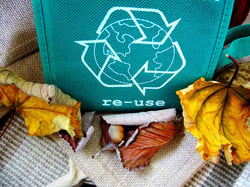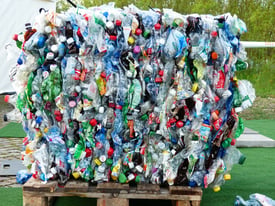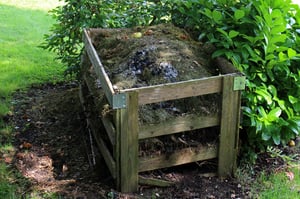With an estimated 120 billion disposable gloves used in the US each year across various industries, we are often asked by companies for the best solution to reduce their environmental impact of glove use.
This can be influenced in several ways. Of the “Reduce, Reuse and Recycle” philosophy, Eagle focuses on the “reduce” and is making significant gains for our customers.
Reduce: The Effective Solution

Eagle is committed to responsible environmental sourcing, which ensures the impacts of glove production are assessed. We continually work to find solutions to minimize the negative impact of our products on the planet.
By supplying new technology manufactured gloves of superior quality with improved durability, we can reduce our customers’ usage by up to 30%. New technology Eagle nitrile gloves are lightweight yet highly durable, and provide significant waste savings in terms of glove weight and associated packaging.
With increasing consumer demand for better transparency, companies can easily reduce their own environmental impact by considering their glove type, weight and most importantly quality; instantly reducing their overall environmental footprint.
Reuse: Post-Consumer Items

Included in Eagle Protect’s’ R&D, we worked with one of New Zealand’s largest infrastructure construction companies to research the recycling potential of Eagle nitrile disposable gloves, for reuse as a bitumen additive for road surface products.
Glove samples were shredded and added to a routine production grade bitumen, there was a lack of softening or dissolving of the material to blend effectively with the bitumen mixture, even after extreme temperatures over prolonged periods of time. Further research indicated the physical properties of nitrile polymers used in glove manufacturing require a melting point of 284°C, an unsustainable & costly temperature to maintain.
Recycle

Disposable glove recycling is currently conducted by TerraCycle. This works by purchasing and collecting gloves in a Zero Waste Box, then shipping to the recycling facility. The waste is separated into the various forms of plastic then undergoes extrusion and pelletization to be molded into new recycled plastic products. The additional collection bin and shipping is estimated to approximately double the cost of gloves, making it infeasible for some companies.
Eagle STRETCHPoly and TPE gloves are 100% recyclable, depending on local municipality's recycling capabilities. They can also be recycled by Revolution Bag, following a closed-loop recycling process, turning products into trash bags for reuse.

Compostable
Compostable gloves are made from Polylactic acid (PLA), a plastic substitute made from fermented plant starch. These gloves must be disposed of in commercial composting facilities to be of environmental benefit, and currently only a few hundred industrial-grade composting facilities can be found across the US. Compostable gloves do not have any FDA compliance testing, therefore are not a recommended food safe option or for use with chemicals.
Biodegradable
Please Note: Since this initial publication in May 2024, the ASTM D5526 standard has been balloted for withdrawal with no replacement because THERE IS NO CORRELATION BETWEEN THIS TEST AND ACTUAL LANDFILL BIODEGRADABILITY. The biodegradable claims in the ASTM D5511 standard are also under review. We will update the biodegradable glove claim information when the review processes have been finalized.
Latex gloves are made from natural rubber using a tree tapping process from the Hevea Brasiliensis tree, and are understood to biodegrade at a faster rate than other glove types. Latex gloves are generally not used in food handling due to potential consumer and glove user allergies.
Nitrile gloves are composed of non-biodegradable raw materials, but recently ‘biodegradable’ nitrile gloves options have become available. Here's a blog explaining what nitrile is.
We're actively exploring options for 'biodegradable' nitrile gloves, but thus far, we haven't identified any that offer clear advantages when considering their total environmental impact. Read more about why consideration of the full glove lifecycle is necessary when selecting a sustainable glove option, including responsibly sourced nitrile gloves with proven performance, no harmful toxins and an overall reduction in glove usage and waste. Typically biodegradation increases CO2 production, which is in-keeping with certified lifecycle assessments of similar “biodegradable” products, shown to have three times the greenhouse gas emissions.
It is also strongly advised to check the speed of biodegradability. Excess speed may affect a glove’s physical and chemical resistance properties, reducing durability and performance.
We are proactively exploring biodegradable glove options, and so far have not found any proven to be advantageous when total environmental impact is considered.
Vinyl gloves are non-biodegradable and made from polyvinyl chloride (PVC) and plasticizers. The human health impacts of PVC across its lifecycle, including disposal and occupational exposure, find PVC leads to the release of dangerous quantities of dioxin and other carcinogens, putting PVC consistently among the worst materials for human health impacts. This is one of several reasons Eagle Protect chose to discontinue sales of vinyl disposable gloves.
Contact Us
Contact us to find out how we can help your company switch to a more sustainable glove option and to reduce your own environmental impact.





